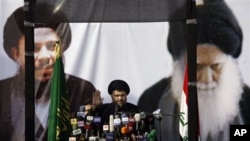Anti-U.S. cleric Moqtada al-Sadr addressed his followers in the Iraqi city of Najaf Saturday after returning from a nearly four-year stint studying Shi’ite theology in Iran.
Thousands of supporters came to cheer their long absent leader after his self-imposed exile in Iran.
Moqtada al-Sadr left Iraq nearly four years ago when U.S. forces had reached a pinnacle of troop strength and now he was returning to a different Iraq, ready to assert its independence.
Much of Sadr’s rhetoric on Saturday drew applause with many in the crowd being devoted supporters.
Iraq is still occupied, Sadr claims, and his followers must continue to resist the occupiers - U.S. and others - by all possible means. He then urged the crowd to chant ‘down with the occupant.’
At the gathering in the Shi’ite stronghold of Najaf, Sadr appeared to have buried his longstanding animosity with Iraqi Prime Minister Nouri al-Maliki, whose recently formed government he finally agreed to support. That support, however, is tempered.
He says that the Iraqi government has now been formed and that he is willing to support it if it serves the interests of the people. If not, he threatens vaguely, there are avenues to pursue.
Mr. Maliki, for his part, addressed Moqtada al-Sadr and others, telling a gathering of Iraqi police officers his erstwhile opponents are now in the government and should stop complaining.
He insists that no one should complain that he has been deprived of a place within the government, and so no one should flout the law and create disturbances.
Iraq expert James Denselow of Kings College in London stresses that Moqtada al-Sadr is a "component of Iran’s strategy in Iraq," and that Sadr has "shown himself to be pragmatic enough to abstain from violence," as the U.S. prepares to withdraw by year’s end.
Sadr’s fiery rhetoric, he notes, looks calculated to resemble the lingo of Lebanon’s Hezbollah, and his politics appears to center on Hezbollah’s state-within-a-state model.
"The Hezbollah model is shown clearly in his comments," said Denselow. 'He will use the government as far at it is useful for him and his party and he will see the state as a prize to be captured and to be sort of patronized in terms of his supporters through ministries and through finance, but he will not necessarily look to build the central state and Maliki as independent actors to themselves."
Meanwhile, Prime Minister Maliki, he argues, has both domestic and regional issues to deal with, trying to keep his fragile coalition together and trying to please both the Arabs and the Iranians. As evidence of the fence he now straddles, Mr. Maliki hosted Arab League chief Amr Moussa Saturday, asking to host the next Arab summit. The visit came just 48 hours after that of Iran’s new acting Foreign Minister Ali Akbar Salehi.
Moqtada al-Sadr Tells Followers He Supports New Iraqi Government




